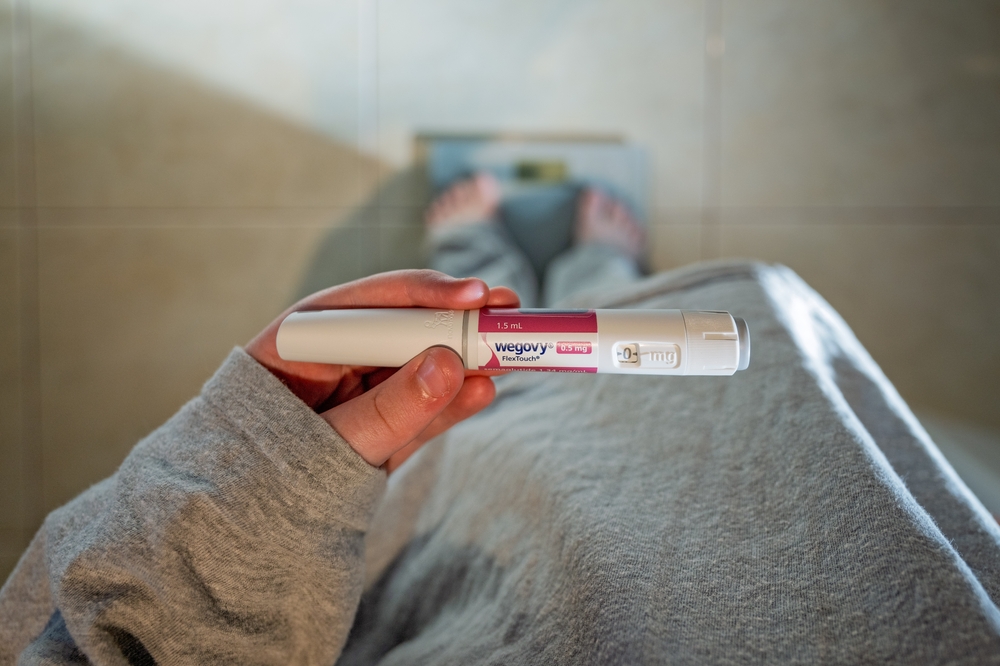Quick answer: When you stop taking Wegovy, your appetite typically increases, weight regain becomes more likely, and your body’s blood sugar and hormone balance may shift – making a gradual, monitored discontinuation plan the safest option.
How Wegovy works
Wegovy (semaglutide) is a prescription medication designed to help with chronic weight management. It mimics a natural hormone called GLP-1 (glucagon-like peptide-1), which plays a key role in regulating appetite and blood sugar levels. When taken regularly, Wegovy helps reduce hunger signals in the brain, slow down digestion and stabilise blood sugar. The result is that people feel fuller for longer, eat less and gradually lose weight.
Over time, the body adjusts to this new metabolic rhythm. Many users report smaller portion sizes, fewer cravings, and a greater sense of control around food – something that can feel revolutionary for those who have struggled with yo-yo dieting for years.
However, Wegovy isn’t necessarily designed to be a lifelong fix. Doctors generally prescribe it as part of a broader plan that includes nutrition, physical activity and behavioural support. Understanding what happens when the medication stops is crucial for maintaining long-term results.
Why people stop taking Wegovy
There are many reasons someone might stop taking Wegovy. Some people reach their weight loss goals and decide to come off the medication. Others experience side effects, face supply shortages or find the cost difficult to sustain.
Even with the best results, continuing indefinitely isn’t always ideal. Many patients and clinicians view Wegovy as a tool to reset metabolic habits rather than a permanent solution. Still, stopping it suddenly or without a proper plan can lead to significant challenges.
Common reasons for stopping include:
- Achieving target weight. Patients may feel confident managing their weight without medication, with new habits and a better perspective on food and exercise.
- Side effects. Excessive nausea, bloating or fatigue can lead to discontinuation.
- Cost or availability. Wegovy can be expensive and is sometimes hard to access.
- Medical advice. Doctors might suggest a break or transition to another treatment.
Whatever the reason, it’s essential to understand how your body might respond once Wegovy leaves your system.
What happens immediately after stopping Wegovy?
When you stop Wegovy, your body begins adjusting to life without the synthetic GLP-1 hormone support. Because semaglutide has a long half-life (about one week), it takes several weeks to fully clear from your system. During that time, changes in hunger, metabolism and energy can start to appear.
Appetite and hunger changes
The most noticeable shift for most people is an increase in appetite. Without Wegovy suppressing hunger hormones, your brain starts responding to natural hunger cues again, often more intensely than during treatment. Meals may begin feeling less filling, cravings may return, and portion control can become more difficult.
Many users describe this phase as frustrating because the appetite surge can feel out of proportion to what they’re eating. It’s not just psychological; it’s your body trying to restore its baseline energy balance after a period of restriction and synthetic influence.
Weight regain risks
Weight regain after stopping Wegovy is common, particularly if lifestyle habits aren’t well established. Studies show that people can regain up to two-thirds of their lost weight within a year of stopping the medication. The reasons are both biological and behavioural.
Without Wegovy, metabolism slows slightly, hunger increases, and the body becomes more efficient at storing fat – especially if calorie intake creeps upward. Emotional triggers like stress or boredom can also reignite old eating patterns.
The key to minimising regain lies in continuing healthy habits and working closely with a healthcare provider to manage expectations and adjustments.
Blood sugar fluctuations
Wegovy’s influence on insulin and blood sugar regulation is significant – after all, it’s a semaglutide drug similar to Ozempic – particularly for those with type 2 diabetes or insulin resistance. When discontinued, blood sugar levels may rise slightly as insulin sensitivity decreases.
This doesn’t mean immediate danger for most people, but it’s worth monitoring closely. If you’ve used Wegovy to manage prediabetes or metabolic issues, your doctor may recommend regular blood tests during the transition period.
Potential side effects after stopping Wegovy
While Wegovy’s withdrawal isn’t like coming off a stimulant or addictive behavioural medication, your body does experience adjustments that can cause mild side effects.
Gastrointestinal changes
Since Wegovy slows digestion, stopping it can lead to the opposite effect – faster digestion and potential stomach discomfort. Some people experience increased hunger pangs, irregular bowel movements or mild bloating as the gut rebalances.
It’s also common for people to feel hungrier sooner after meals or crave more carbohydrate-rich foods, as the gut-brain hunger loop recalibrates.
Low energy or fatigue
Your metabolism and energy balance change as Wegovy leaves your system. Some users notice temporary fatigue, especially given their calorie intake is likely at an all-time low. This can be due to hormonal fluctuations or mild dehydration, as your body adjusts to processing food more quickly again.
Maintaining steady meals, staying hydrated and easing back into regular physical activity can help combat this dip in energy.
Mood fluctuations
Changes in appetite and energy can also influence mood. Some people report feeling irritable, anxious or demotivated after stopping Wegovy – things often exacerbated if they start regaining weight. This emotional reaction is completely normal and generally short-lived.
Working with a mental health professional or support group during this period can make a huge difference. Remember, weight management is as much psychological as it is physical.
How to safely stop taking Wegovy
Coming off Wegovy should always be done under close medical supervision. Your provider can help you taper your dosage, monitor your symptoms and develop a post-medication plan tailored to your goals.
Below is a simple table summarising the safe discontinuation process and key steps to follow:
| Step | What It Involves | Why It Matters |
| Consult your doctor | Discuss your reasons and timing before stopping. | Ensures safety and continuity of care. |
| Gradual dose reduction | Slowly lower your dose instead of stopping abruptly. | Reduces rebound hunger and side effects. |
| Monitor key metrics | Track weight, appetite, mood and blood sugar. | Detects early signs of unwanted changes. |
| Maintain healthy habits | Continue balanced eating and regular movement. | Helps preserve weight loss results. |
| Plan for emotional support | Seek community or professional guidance. | Prevents relapse and supports motivation. |
Consult your healthcare provider
Your doctor is your best resource when planning to stop Wegovy. They can help determine whether it’s the right time in your overall health journey and create a strategy that aligns with your long-term goals. In some cases, they may suggest alternative medications or recommend additional lifestyle coaching.
Never stop taking Wegovy without discussing it with a healthcare professional, especially if you have diabetes or other metabolic conditions.
Gradual reduction vs. sudden stop
Tapering off Wegovy gradually allows your body to adjust more comfortably. Instead of jumping from a full dose to zero, your provider may reduce your dosage over several weeks. This helps minimise rebound hunger, nausea, and other transitional effects.
A sudden stop might seem more manageable, but it can cause stronger appetite surges, faster weight regain, and generally more severe side effects. Slow and steady wins here.
Monitor your health
During the discontinuation phase, track your energy, appetite and mood daily. Keeping a short journal can reveal patterns and help you address challenges early. If you notice unusual symptoms, such as persistent dizziness, low mood or sharp changes in appetite, make sure to share them with your healthcare provider.
Maintain healthy habits
Healthy habits are your biggest defence against weight regain after Wegovy. Focus on:
- Balanced meals. Include protein, fibre and healthy fats at every meal.
- Routine exercise. Mix cardio and strength training to maintain muscle mass.
- Consistent sleep. Rest impacts hunger hormones and energy.
- Mindful eating. Pay attention to hunger cues and emotional triggers.
Many people find that continuing their healthy routines from the Wegovy phase helps maintain both weight and confidence. Most also find it easier to uphold these habits after ending treatment when compared to before they took the drug.
Consider alternatives
If you still need help managing appetite or weight after Wegovy, there are other options. Some people transition to lower-dose GLP-1 medications or non-hormonal alternatives that offer similar support with fewer side effects.
Your healthcare provider may recommend:
- Lifestyle-focused programs (nutritionist-led or behavioural support)
- Other weight management medications (depending on your medical history)
- Supplements or dietary adjustments that aid metabolism
The goal isn’t to replace Wegovy immediately but to ensure you have the proper support for long-term balance.
Manage emotional Impact
Stopping Wegovy can be an emotional process – especially if you fear losing progress. It’s important to reframe your mindset from relying on medication to trusting your learned habits.
Reflect on what worked well during your time on Wegovy, e.g. portion control, mindful eating, regular check-ins and better self-awareness. These tools don’t disappear when the injections stop. Support groups or therapy can also help address emotional eating, self-esteem, and body image concerns that might arise during the transition.
Sustainable weight management with The Virtual Slimming Clinic
Stopping Wegovy doesn’t mean your progress is lost. It simply marks the beginning of a new phase – one that relies more on the skills and routines you’ve built rather than medication. While some weight regain and appetite changes are regular, they can be managed with awareness, structure, and support.
It’s also worth noting that for some people, transitioning off the drug might not be the right option. It’s all about working closely with your prescriber and clinic. The Virtual Slimming Clinic is the ultimate partner for sustainable weight loss, offering clear, actionable guidance alongside all our prescriptions. Visit our site today to learn more from blogs, guides and contact options.
Frequently Asked Questions
Will I regain weight after stopping Wegovy?
It’s possible, especially if habits slip or if you stop suddenly. However, many people maintain much of their weight loss by continuing balanced nutrition, regular exercise and mindful eating practices.
How quickly will appetite return?
Most people notice their appetite increasing within 2–4 weeks after their last dose. The intensity varies depending on dosage, duration of use and individual metabolism.
Is it safe to stop Wegovy abruptly?
It’s generally better to taper off gradually under medical supervision. Abruptly stopping may lead to stronger cravings, mood changes, and weight regain.
Can I switch to another weight loss medication?
Yes, but this should be done under a doctor’s guidance.
How does Wegovy affect appetite and cravings?
Wegovy works by mimicking the GLP-1 hormone, which slows digestion and signals the brain to feel full. When stopped, those signals fade, and cravings can return.














